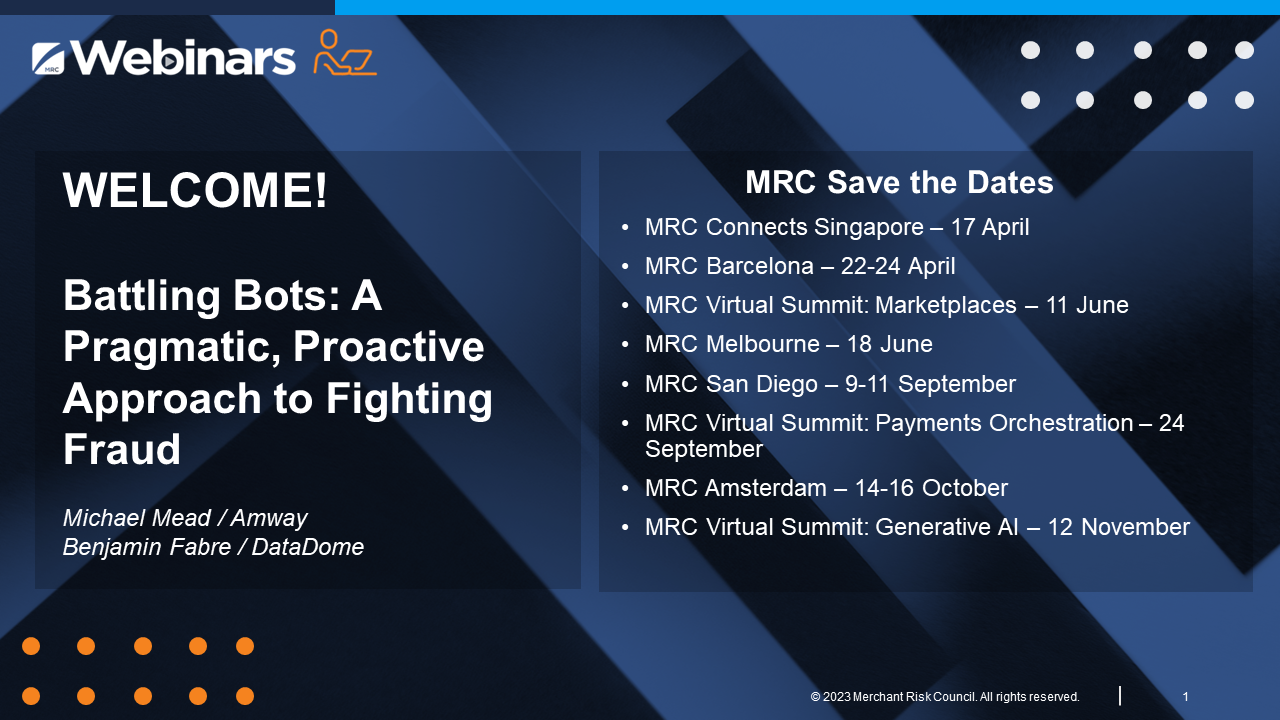How to Elevate Your Chargeback Management and Deflect Disputes
Member News
Blog
Friendly Fraud
Kount
Dec 02, 2020
Blog
In a year of firsts, eCommerce has also undergone rapid change. Consumers have flocked to existing digital channels and embraced new ones. And popular buying options now include buy-online-pick-up-in-store (BOPIS) and click-and-pick. These new channels are convenient, and customers will expect access long after 2020 ends.
But new digital channels bring fraud challenges that include friendly fraud. Because it is often initiated by otherwise legitimate consumers, friendly fraud is difficult to detect and rarely triggers traditional eCommerce protection tools. The result can lead to a spike in chargebacks, and new research shows that 51% of businesses expect to see an increase in chargebacks this holiday season.
Businesses can combat this trend by combining pre-authorization, AI-driven fraud prevention, with new tools to prevent and resolve pre-disputes after the transaction has taken place. Together, these tools allow merchants to protect against criminal fraud within the customer journey and resolve pre-disputes after payment, should the merchant implement these third-party solutions.
This costly problem is also complex. Friendly fraud takes several forms, and each one requires a unique response.
1. Increased manual reviews
To avoid chargebacks, merchants may perform more manual reviews. But those reviews can push the total cost of the chargeback to over three times the cost of the original transaction, according to a 2019 Mercator Advisory Group report.
2. Wasted labor and growth opportunities
Higher-cost employees may be the ones who resolve representments, complaints, audits, and other fraud-related issues that come with increased chargebacks. That is time and effort they could spend on more profitable activities. Similarly, companies or merchants that exceed chargeback limits may spend more time on chargebacks than tasks with higher returns.
3. Decreased bank authorization rates
When banks perceive a merchant account as high-risk, they will tighten their fraud filters and decline more orders -- or all orders. As a result, merchants can lose revenue from legitimate purchases. Not to mention, merchants also lose customer acquisition costs from those legitimate purchases.
4. Damaged brand loyalty
Your customers and shareholders keep you in business. Their trust in your brand is paramount to your success. When customers experience fraud, they associate the breach with the brand rather than the bad actor. And customers whose orders are caught up in manual reviews or declined altogether may become impatient and choose a competitor.
But this approach does not solve friendly fraud, and worse, it can cause false positives and customer insults. Among merchants that use fraud prevention, Kount anecdotally estimates friendly fraud causes around 40% of their chargebacks. Those chargebacks can still lead to substantial losses and even push merchants into fraud monitoring programs.
The nuances in friendly fraud cause additional complications. While merchants would love to block shoppers who engage in malicious friendly fraud, illegitimate and accidental fraud is different. In those cases, merchants would rather identify the problem and resolve it in a way that preserves the sale and the customer relationship.
What does all of this mean? Payments fraud prevention is not enough. Merchants need post-payment, pre-dispute options to manage friendly fraud.
The last stop, "resolve disputes in near real-time," is the historical roadblock. But new industry tools can help solve the unique challenges of friendly fraud. Merchants can combine those tools with existing fraud prevention solutions to effectively defend against fraud and non-fraud chargebacks.
But speed attracts bad actors who take advantage of the pressure on merchants and steal goods. On their own, merchants rarely have the information they need to identify and stop fraud, with chargebacks being the inevitable result.
As digital channels dominate commerce, robust data networks that work in real-time provide an answer to chargeback management. With built-in protection and accessible information, merchants no longer need to devote precious time to fraud detection and manual reviews. Instead, they can focus on their critical work: keeping customers happy and growing revenue.
About Kount
Kount's Identity Trust Global Network delivers real-time fraud prevention and account protection and enables personalized customer experiences for more than 9,000 leading brands and payment providers. Linked by Kount's award-winning AI, the Identity Trust Global Network analyzes signals from 32 billion annual interactions to personalize user experiences across the spectrum of trust, from ensuring frictionless experiences to blocking fraud. Quick and accurate identity trust decisions deliver safe payment, account creation, and login events while reducing digital fraud, chargebacks, false positives, and manual reviews. For more information, please visit Kount.com.
About Verifi
Since 2005, Verifi has been a leader in the payments industry, providing innovative, end-to-end payment solutions that protect against fraud, prevent and resolve disputes, and recover revenue lost to chargebacks. In 2019, Verifi was acquired by Visa, combining technologies to provide enhanced fraud and dispute management solutions on a global scale. Verifi creates strategic, adaptive technologies for sellers, payment facilitators, acquirers, and issuers, building sustaining partnerships to deliver value, increase profits, and promote brand growth. For more information, please visit Verifi.com.
But new digital channels bring fraud challenges that include friendly fraud. Because it is often initiated by otherwise legitimate consumers, friendly fraud is difficult to detect and rarely triggers traditional eCommerce protection tools. The result can lead to a spike in chargebacks, and new research shows that 51% of businesses expect to see an increase in chargebacks this holiday season.
Businesses can combat this trend by combining pre-authorization, AI-driven fraud prevention, with new tools to prevent and resolve pre-disputes after the transaction has taken place. Together, these tools allow merchants to protect against criminal fraud within the customer journey and resolve pre-disputes after payment, should the merchant implement these third-party solutions.
Three types of friendly fraud
Friendly fraud occurs when a customer initiates a chargeback on a legitimate purchase. This problem is widespread: in Kount's consumer research, 89% would not contact a business first to question a suspicious charge; 56% would call their bank or credit card company instead.This costly problem is also complex. Friendly fraud takes several forms, and each one requires a unique response.
- Malicious: A customer makes a purchase and intends to initiate a chargeback. They may claim that a product did not arrive and request a refund or a duplicate product.
- Illegitimate but not malicious: A customer becomes frustrated by shipment delays and initiates a chargeback. For example, when a concert or event is canceled -- common in 2020 -- ticket holders may use a chargeback to obtain a quick refund.
- Accidental: A customer initiates a chargeback when they do not recognize a purchase on their bank statement. For example, a parent may not realize that their child made in-app purchases for a video game.
The hidden costs of friendly fraud
Product losses and chargebacks are direct costs. But when consumers do not dispute charges with you, they introduce the hidden costs of chargebacks.1. Increased manual reviews
To avoid chargebacks, merchants may perform more manual reviews. But those reviews can push the total cost of the chargeback to over three times the cost of the original transaction, according to a 2019 Mercator Advisory Group report.
2. Wasted labor and growth opportunities
Higher-cost employees may be the ones who resolve representments, complaints, audits, and other fraud-related issues that come with increased chargebacks. That is time and effort they could spend on more profitable activities. Similarly, companies or merchants that exceed chargeback limits may spend more time on chargebacks than tasks with higher returns.
3. Decreased bank authorization rates
When banks perceive a merchant account as high-risk, they will tighten their fraud filters and decline more orders -- or all orders. As a result, merchants can lose revenue from legitimate purchases. Not to mention, merchants also lose customer acquisition costs from those legitimate purchases.
4. Damaged brand loyalty
Your customers and shareholders keep you in business. Their trust in your brand is paramount to your success. When customers experience fraud, they associate the breach with the brand rather than the bad actor. And customers whose orders are caught up in manual reviews or declined altogether may become impatient and choose a competitor.
Why friendly fraud is difficult to detect and stop
To merchants, most friendly fraud looks the same. That is why many fraud prevention solutions try to reduce fraud at the point of payment. With fewer fraudulent transactions -- and risky customers -- merchants see less friendly fraud.But this approach does not solve friendly fraud, and worse, it can cause false positives and customer insults. Among merchants that use fraud prevention, Kount anecdotally estimates friendly fraud causes around 40% of their chargebacks. Those chargebacks can still lead to substantial losses and even push merchants into fraud monitoring programs.
The nuances in friendly fraud cause additional complications. While merchants would love to block shoppers who engage in malicious friendly fraud, illegitimate and accidental fraud is different. In those cases, merchants would rather identify the problem and resolve it in a way that preserves the sale and the customer relationship.
What does all of this mean? Payments fraud prevention is not enough. Merchants need post-payment, pre-dispute options to manage friendly fraud.
Five ways to intercept and deflect chargebacks
To solve the problem of friendly fraud, merchants first need to grapple with fraud at each step of their customers' journey. They will need to identify good customers, stop account takeover, protect digital payments, and resolve disputes quickly. And they need to coordinate all of these activities in near real-time.The last stop, "resolve disputes in near real-time," is the historical roadblock. But new industry tools can help solve the unique challenges of friendly fraud. Merchants can combine those tools with existing fraud prevention solutions to effectively defend against fraud and non-fraud chargebacks.
- Stop fraudulent transactions with AI-driven protection -- Fraud prevention built on artificial intelligence and a robust data network helps businesses stop fraud from login through payment. These solutions work in real-time to reduce fraud and manual reviews. They can also deliver analytics to help improve business operations.
- Prevent disputes at the point of inquiry -- Merchants can engage tools that automatically provide issuers and customers with enhanced transaction information. Consumers can use this information to identify a purchase, and merchants avoid a dispute.
- Resolve pre-disputes automatically -- Merchants can auto-decision pre-disputes and resolve them with a credit based on pre-defined rules. In this way, they can save manual review time and cost. They also prevent dispute filing errors and reduce chargeback liability.
- Quickly resolve confirmed disputes -- Tools can flag a pre-dispute before it becomes a chargeback, which gives the merchant time to issue a refund.
- Use data to optimize fraud protection -- Merchants can collect transaction data, confirmed fraud data, and dispute data to improve their analytics, policies, rules, and operations. They can refine protection across the customer journey to reduce costs and chargebacks.
To stop friendly fraud, you need speed and data
Convenience is driving digital transformation in eCommerce. Consumers expect easy shopping, fast transactions, and swift delivery or pickup. This short timeline hinders merchants that need to act quickly to retain good customers and attract new ones.But speed attracts bad actors who take advantage of the pressure on merchants and steal goods. On their own, merchants rarely have the information they need to identify and stop fraud, with chargebacks being the inevitable result.
As digital channels dominate commerce, robust data networks that work in real-time provide an answer to chargeback management. With built-in protection and accessible information, merchants no longer need to devote precious time to fraud detection and manual reviews. Instead, they can focus on their critical work: keeping customers happy and growing revenue.
About Kount
Kount's Identity Trust Global Network delivers real-time fraud prevention and account protection and enables personalized customer experiences for more than 9,000 leading brands and payment providers. Linked by Kount's award-winning AI, the Identity Trust Global Network analyzes signals from 32 billion annual interactions to personalize user experiences across the spectrum of trust, from ensuring frictionless experiences to blocking fraud. Quick and accurate identity trust decisions deliver safe payment, account creation, and login events while reducing digital fraud, chargebacks, false positives, and manual reviews. For more information, please visit Kount.com.
About Verifi
Since 2005, Verifi has been a leader in the payments industry, providing innovative, end-to-end payment solutions that protect against fraud, prevent and resolve disputes, and recover revenue lost to chargebacks. In 2019, Verifi was acquired by Visa, combining technologies to provide enhanced fraud and dispute management solutions on a global scale. Verifi creates strategic, adaptive technologies for sellers, payment facilitators, acquirers, and issuers, building sustaining partnerships to deliver value, increase profits, and promote brand growth. For more information, please visit Verifi.com.

Host a Webinar with the MRC
Help the MRC community stay current on relevant fraud, payments, and law enforcement topics.
Submit a Request
Publish Your Document with the MRC
Feature your case studies, surveys, and whitepapers in the MRC Resource Center.
Submit Your Document





